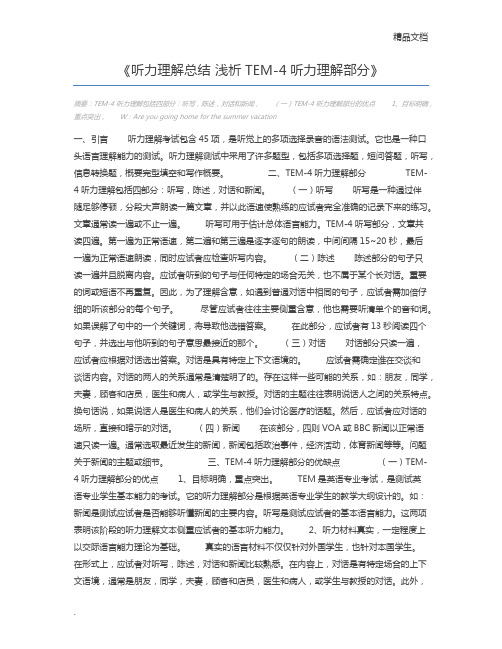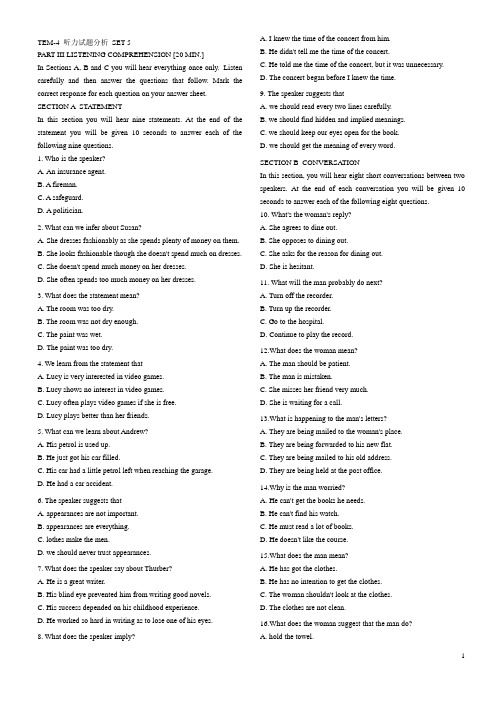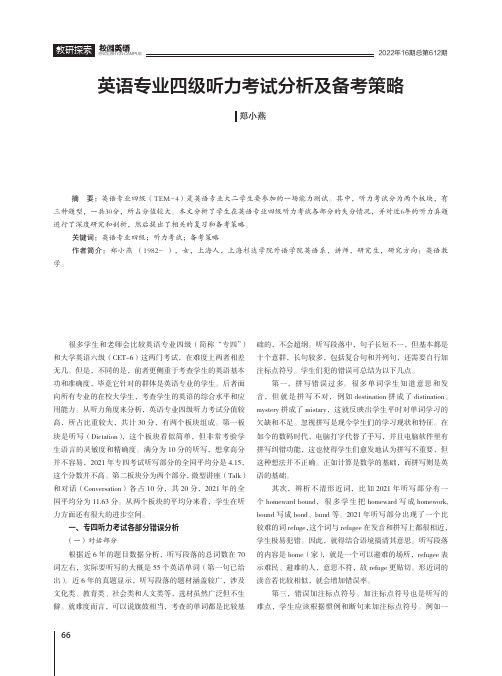专四听力题型分析报告
- 格式:doc
- 大小:79.50 KB
- 文档页数:11

日语专业四级考试听力试题分析及应对策略日语专业四级考试是日语专业学生必须参加的重要考试之一,听力部分是考试的重要组成部分。
听力试题不仅考察考生对日语语音、语调的感知能力,更重要的是考察考生对日语听力材料的理解能力。
下面我们将针对日语专业四级考试听力试题进行分析,并提出应对策略。
一、听力试题分析1. 听力试题形式日语专业四级考试听力试题主要包括短对话、长对话、短文、长文等形式。
对话内容涉及日常生活、学习、工作等各个方面,涉及的语音语调、词汇句型也比较灵活。
2. 听力试题内容听力试题内容涉及日常生活中的各种场景,如购物、旅行、订餐、学校生活等。
内容涵盖面广,考察了广大考生的日常用语能力和实际交际能力。
3. 听力试题难度日语专业四级考试听力试题的难度逐渐增加,从简单的日常对话到较复杂的长篇文章,不仅考察了考生的语言基础知识,更注重了考生对语境的理解和推理能力。
二、应对策略1. 增强听力训练在备考过程中,考生应加强日语听力训练,提高对不同语速、语调、音调的感知能力。
可以通过听力练习书籍、听力练习软件等多种方式进行听力训练,尽量模拟考试中的各种听力场景,增加对各种类型的听力材料的适应能力。
2. 注重语境理解在听力考试中,考生除了要听清楚对话内容外,更要注重对语境的理解。
要有敏锐的语感,根据对话中的线索和背景信息来进行推断和判断。
在平时的日常学习中,也要注重积累各种语境中的日语表达,增加对语境的敏感度。
3. 提高词汇量日语专业四级考试听力中会涉及大量日常用语和场景中的表达,因此考生需要掌握丰富的日语词汇。
可以通过背单词、阅读和听力练习等方式来提高词汇量,从而更好地理解和掌握听力材料中的词汇和句型。
4. 注意细节和关键信息在听力考试中,要注意抓住对话中的细节和关键信息。
有时一些细节信息可能是答题的关键,所以要保持高度的注意力,在短时间内准确抓住重点信息,以免错过答题的关键信息。
5. 制定合理时间规划在考试中,要根据试卷的时间分配合理安排答题时间。

《听力理解总结浅析TEM-4听力理解部分》摘要:TEM-4听力理解包括四部分:听写,陈述,对话和新闻,(一)TEM-4听力理解部分的优点1、目标明确,重点突出,W:Are you going home for the summer vacation一、引言听力理解考试包含45项,是听觉上的多项选择录音的语法测试。
它也是一种口头语言理解能力的测试。
听力理解测试中采用了许多题型,包括多项选择题,短问答题,听写,信息转换题,概要完型填空和写作概要。
二、TEM-4听力理解部分TEM-4听力理解包括四部分:听写,陈述,对话和新闻。
(一)听写听写是一种通过伴随足够停顿,分段大声朗读一篇文章,并以此语速使熟练的应试者完全准确的记录下来的练习。
文章通常读一遍或不止一遍。
听写可用于估计总体语言能力。
TEM-4听写部分,文章共读四遍。
第一遍为正常语速,第二遍和第三遍是逐字逐句的朗读,中间间隔15~20秒,最后一遍为正常语速朗读,同时应试者应检查听写内容。
(二)陈述陈述部分的句子只读一遍并且脱离内容。
应试者听到的句子与任何特定的场合无关,也不属于某个长对话。
重要的词或短语不再重复。
因此,为了理解含意,如遇到普通对话中相同的句子,应试者需加倍仔细的听该部分的每个句子。
尽管应试者往往主要侧重含意,他也需要听清单个的音和词。
如果误解了句中的一个关键词,将导致他选错答案。
在此部分,应试者有13秒阅读四个句子,并选出与他听到的句子意思最接近的那个。
(三)对话对话部分只读一遍,应试者应根据对话选出答案。
对话是具有特定上下文语境的。
应试者需确定谁在交谈和谈话内容。
对话的两人的关系通常是清楚明了的。
存在这样一些可能的关系,如:朋友,同学,夫妻,顾客和店员,医生和病人,或学生与教授。
对话的主题往往表明说话人之间的关系特点。
换句话说,如果说话人是医生和病人的关系,他们会讨论医疗的话题。
然后,应试者应对话的场所,直接和暗示的对话。
(四)新闻在该部分,四则VOA或BBC新闻以正常语速只读一遍。


TEM-4 听力试题分析SET 5PART III LISTENING COMPREHENSION [20 MIN.]In Sections A, B and C you will hear everything once only. Listen carefully and then answer the questions that follow. Mark the correct response for each question on your answer sheet. SECTION A STATEMENTIn this section you will hear nine statements. At the end of the statement you will be given 10 seconds to answer each of the following nine questions.1. Who is the speaker?A. An insurance agent.B. A fireman.C. A safeguard.D. A politician.2. What can we infer about Susan?A. She dresses fashionably as she spends plenty of money on them.B. She looks fashionable though she doesn't spend much on dresses.C. She doesn't spend much money on her dresses.D. She often spends too much money on her dresses.3. What does the statement mean?A. The room was too dry.B. The room was not dry enough.C. The paint was wet.D. The paint was too dry.4. We learn from the statement thatA. Lucy is very interested in video games.B. Lucy shows no interest in video games.C. Lucy often plays video games if she is free.D. Lucy plays better than her friends.5. What can we learn about Andrew?A. His petrol is used up.B. He just got his car filled.C. His car had a little petrol left when reaching the garage.D. He had a car accident.6. The speaker suggests thatA. appearances are not important.B. appearances are everything.C. lothes make the men.D. we should never trust appearances.7. What does the speaker say about Thurber?A. He is a great writer.B. His blind eye prevented him from writing good novels.C. His success depended on his childhood experience.D. He worked so hard in writing as to lose one of his eyes.8. What does the speaker imply? A. I knew the time of the concert from him.B. He didn't tell me the time of the concert.C. He told me the time of the concert, but it was unnecessary.D. The concert began before I knew the time.9. The speaker suggests thatA. we should read every two lines carefully.B. we should find hidden and implied meanings.C. we should keep our eyes open for the book.D. we should get the meaning of every word.SECTION B CONVERSA TIONIn this section, you will hear eight short conversations between two speakers. At the end of each conversation you will be given 10 seconds to answer each of the following eight questions.10. What's the woman's reply?A. She agrees to dine out.B. She opposes to dining out.C. She asks for the reason for dining out.D. She is hesitant.11. What will the man probably do next?A. Turn off the recorder.B. Turn up the recorder.C. Go to the hospital.D. Continue to play the record.12.What does the woman mean?A. The man should be patient.B. The man is mistaken.C. She misses her friend very much.D. She is waiting for a call.13.What is happening to the man's letters?A. They are being mailed to the woman's place.B. They are being forwarded to his new flat.C. They are being mailed to his old address.D. They are being held at the post office.14.Why is the man worried?A. He can't get the books he needs.B. He can't find his watch.C. He must read a lot of books.D. He doesn't like the course.15.What does the man mean?A. He has got the clothes.B. He has no intention to get the clothes.C. The woman shouldn't look at the clothes.D. The clothes are not clean.16.What does the woman suggest that the man do?A. hold the towel.B. go sailing next week.C. buy some towels at once.D. postpone buying towels.17.The woman call the man toA. confirm a staff meeting at 4 o'clock.B. confirm a meeting at 2:30.C. confirm an appointment at 4.D. confirm an appointment at 2:30.SECTION C NEWS BROADCASTQuestion 18 is based on the following news item. At the end of the news item you will be given 10 seconds to answer the following question.Now listen to the news.18.What's the doctors' attitude toward British couples planning millennium babies?A. Disapproving.B. Supportive.C. Surprised.D. Critical.Questions 19 and 20 are based on the following news item. At the end of the news item you will be given 20 seconds to answer the following two questions.Now listen to the news.19.The peace talks between rebels and the Zairian governmentA. have been cancelled.B. are put to a later time.C. took place according to schedule.D. took place ahead of schedule.20.Which of the following statements is TRUE?A. The talks are to take place in South Africa.B. The President has denied to meet with the rebel leader.C. The rebel leader didn't turn up for safety concerns.D. The government still takes control of more part of Zaire. Questions 21, 22 and 23 are based on the following news item. At the end of the news item you will be given 30 seconds to answer the following three questions.Now listen to the news.21.Who has survived the crash?A. Diana's driver.B. The French judge.C. The bodyguard.D. Diana's boyfriend.22.Trevo Rees-Jones has come to Paris toA. receive medical treatment.B. conduct the inquiry.C. answer judge's inquiries.D. investigate the accident.23.How many times has Rees-Jones come to Paris for the inquiry?A. Once.B. Twice.C. Three times.D. Four times.Questions 24 and 25 are based on the following news item. At the end of the news item you will be given 20 seconds to answer the following two questions.Now listen to the news.24. The Russian official's visit to China aims atA. strengthening security cooperation between the two sides.B. expanding into central and eastern Europe.C. discussing about border issues.D. reaching a bilateral agreement in economy.25.Russia expects to establish closer relationships with all of the following EXCEPTA. China.B. IranC. NA TO.D. India.KEY TO LISTENING COMPREHENSION1.A2.C3.B4.B5.A6.D7.A8.C9.B 10 .A11.A 12.B 13.A 14.C 15.B 16.D 17.C 18.A 19.B 2 0.C21.C 22.C 23.D 24.A 25.CEXPLANATION OF LISTENING COMPREHENSIONPART III LISTENING COMPREHENSIONSECTION A STATEMENT1. “我认为你们的保险单没有规定对待火灾造成的损失的保障。

ENGLISH ON CAMPUS2022年16期总第612期英语专业四级听力考试分析及备考策略摘 要:英语专业四级(TEM-4)是英语专业大二学生要参加的一场能力测试。
其中,听力考试分为两个板块,有三种题型,一共30分,所占分值较大。
本文分析了学生在英语专业四级听力考试各部分的失分情况,并对近6年的听力真题进行了深度研究和剖析,然后提出了相关的复习和备考策略。
关键词:英语专业四级;听力考试;备考策略作者简介:郑小燕 (1982- ),女,上海人,上海杉达学院外语学院英语系,讲师,研究生,研究方向:英语教学。
很多学生和老师会比较英语专业四级(简称“专四”)和大学英语六级(CET-6)这两门考试,在难度上两者相差无几。
但是,不同的是,前者更侧重于考查学生的英语基本功和准确度,毕竟它针对的群体是英语专业的学生。
后者面向所有专业的在校大学生,考查学生的英语的综合水平和应用能力。
从听力角度来分析,英语专业四级听力考试分值较高,所占比重较大,共计30分,有两个板块组成。
第一板块是听写(Dictation),这个板块看似简单,但非常考验学生语言的灵敏度和精确度。
满分为10分的听写,想拿高分并不容易,2021年专四考试听写部分的全国平均分是4.15,这个分数并不高。
第二板块分为两个部分,微型讲座(Talk)和对话(Conversation)各占10分,共20分,2021年的全国平均分为11.63分。
从两个板块的平均分来看,学生在听力方面还有很大的进步空间。
一、专四听力考试各部分错误分析(一)对话部分根据近6年的题目数据分析,听写段落的总词数在70词左右,实际要听写的大概是55个英语单词(第一句已给出)。
近6年的真题显示,听写段落的题材涵盖较广,涉及文化类、教育类、社会类和人文类等,选材虽然广泛但不生僻。
就难度而言,可以说旗鼓相当,考查的单词都是比较基础的,不会超纲。
听写段落中,句子长短不一,但基本都是十个意群,长句较多,包括复合句和并列句,还需要自行加注标点符号。

听力试卷总结分析报告一、引言听力是英语学习中的重要技能之一,也是英语考试中的必考内容。
通过听力练习和考试,可以提高学生的听力理解能力,帮助他们更好地掌握英语语言技能。
本文通过对一份听力试卷的总结分析,旨在探讨学生在听力考试中所面临的难题,并提出相应的解决方法,从而帮助学生提高听力技能。
二、试卷总结本次听力试卷共有四个部分,包括听句子、听对话、听短文和听填表格。
整个试卷设计了不同难度级别的题目,旨在考察学生的听力理解能力和应对不同语境的能力。
1. 听句子这部分题目主要考察学生对单词和短语的听力理解能力。
试卷设计了简单的句子,要求学生根据听到的内容选择正确的答案。
这些句子的难点在于语速较快,对于听力较差或不熟悉常用表达方式的学生来说,有一定的挑战。
2. 听对话听对话部分分为多个小题,每个小题都有一个问题。
这部分试题考察学生对对话内容的理解能力,要求根据听到的对话内容选择正确的答案或填写相关信息。
这部分题目的难点在于对话中会出现一些常见口语表达和隐含信息,对于刚开始学习英语或非母语为英语的学生来说,理解这些表达方式和信息可能会有困难。
3. 听短文听短文部分包括了一个或多个独立的短文,每个短文都有多个问题。
这部分试题考察学生对文章整体内容的理解能力,要求根据听到的短文回答问题或完成相关任务。
这部分题目的难点在于对短文的整体理解以及对细节信息的捕捉。
有些短文内容比较复杂,包括了人物、地点、时间等多个要素,需要学生具备一定的听力记忆和归纳总结能力。
4. 听填表格听填表格部分主要考察学生对听到的信息进行准确记录的能力。
在听力过程中要快速捕捉到关键信息,并准确填写到表格中。
这部分题目的难点在于听力速度较快,需要学生具备快速反应和准确记录的能力。
三、问题分析通过对试卷的总结分析,我们可以发现学生在听力考试中常常会遇到以下问题:1. 听力速度过快,难以准确理解听到的内容。
2. 对一些常见口语表达和隐含信息的理解能力较差。
分析四级真题中的听力听写题型【分析四级真题中的听力听写题型】在英语四级听力部分中,听写题型常常是让考生在听到一段短文后,准确地听写出其中的一个或多个单词。
听力听写题主要考察考生对于英语听力的理解和笔记能力,并且能够在短时间内对所听到的内容进行正确记录。
下面将就四级真题中的听力听写题型进行分析。
1. 听力听写题的形式多样在四级真题中,听力听写题的形式多种多样,可能是填写正文的空白处所缺少的单词,也可能是听写一个短语或句子中的关键词汇。
这种多样性的形式使得听写题更具挑战性,要求考生在倾听短文的同时,能够准确地辨认并记录关键信息。
2. 考查听力理解和笔记能力听写题型不仅要求考生对英语听力的理解能力较高,还需要考生具备一定的笔记能力。
考生需要在短时间内听到的信息准确地记录下来,这就要求考生能够快速辨认出关键词汇,并迅速将其记录。
在听写的过程中,考生应该注意抓住短文中的关键信息,避免被无关信息干扰,以提高听写的准确性。
3. 注意细节和语音辨认在真题中,听力听写题可能涉及到一些细节信息,比如数字、地名、人名等等。
这就要求考生在倾听短文时要格外留心这些细节信息,并准确地记录下来。
此外,由于英语中存在较多的同音异义词,考生还需要具备一定的语音辨认能力,以确保听写的正确性。
4. 预测和积累常见词汇为了更好地应对听力听写题,考生可以通过预测可能出现的词汇来准备。
在备考过程中,可以通过学习历年真题和听力材料,积累一些常见的单词和短语,以提高对于听力内容的理解能力。
此外,还可以通过多做一些听力练习,提高自己的听力技巧和反应速度。
总之,四级真题中的听力听写题型是考察考生对英语听力的理解和笔记能力的重要环节。
考生需要注意细节信息,加强对于常见词汇的预测和积累,并提高自己的语音辨认能力,以在短时间内准确地记录所听到的内容。
通过合理的备考和练习,相信考生们一定能够在四级真题中取得好成绩。
日语专业四级考试听力试题分析及应对策略导语:日语专业四级考试作为对日语听力、阅读、写作和口语能力的一次全面检验,其中听力部分占据了非常重要的地位。
具备良好的听力技巧和策略,是考生顺利通过日语专业四级考试的关键之一。
下面将从听力试题的类型、特点和应对策略几个方面,为考生分享一些应对日语专业四级考试听力的技巧和经验。
一、日语专业四级考试听力试题的类型和特点1. 类型:日语专业四级考试听力试题主要包括听短对话、长对话、独白和新闻等四大类型。
- 听短对话:一般包括两人之间的简短问答,主要考察考生对日语口语的理解和日常对话的应答能力。
- 听长对话:较长的对话内容,可能是两人或多人之间的讨论或谈话,考察考生对于更复杂情境下的听力理解能力。
- 听独白:讲述者对某一话题进行说明或阐述,考察考生对于较为复杂信息的听力理解和总结能力。
- 听新闻:播音员或记者播报的新闻内容,考察考生对于日语语速较快,语言较为正式的听力理解能力。
2. 特点:- 快速:试题播放速度较快,考生需要在短时间内理解并做出反应。
- 多样化:试题涉及的话题和场景多样化,既有日常生活中的对话和讨论,也有涉及学校、工作、社会等各个领域的内容。
- 信息量大:部分题目可能会涉及较为复杂的信息,考生需要具备丰富的词汇和语法知识,以及对于日语表达的理解能力。
二、应对策略1. 提前熟悉听力材料的话题和场景在考试之前,可以通过各种渠道获取日语听力材料,熟悉各类话题和场景的表达方式和常用词汇,以便在考试中更快地理解和应对问题。
2. 注重语音语调的训练日语的语音语调对于听力理解至关重要,因此考生可以通过听力材料或者日语学习资源进行听力训练,提高对于日语语音语调的敏感度和理解能力。
3. 提高日语词汇和语法水平在日语听力的理解过程中,丰富的词汇和熟练的语法运用是至关重要的。
考生可以通过背单词、阅读日语材料、练习语法题等方式,系统性提高自己的日语词汇和语法水平。
4. 注重听力训练在备考过程中,考生可以通过大量的听力练习,提高自己的听力速度和听力理解能力。
大学英语专业四级考试共有六个部分:听写、听力理解、完型填空、语法与词汇、阅读理解、写作。
整个考试需时130分钟。
听力的比重是30%,主观性试题和客观性试题各占一半。
与四六级考试不同,专四、专八考试首先考听力而不是写作。
I. 听写(PART I: Dictation)1.测试要求:(a )能在全面理解内容的基础上逐字逐句写出所听材料.(b)拼写和标点符号正确无误,错误率不超过8%(c)考试时间15分钟2. 测试形式:本部分为主观试题.所听材料共念四遍.第一遍用正常语速朗读,录音语速为每分钟120个单词,让学生听懂材料大意.第二三遍朗读时意群分句和句子之间留出约15秒的空隙,让学生书写.第四遍再用正常语速朗读,让学生检查.3. 测试目的:测试学生听力理解能力拼写熟练程度以及正确运用标点符号的能力.4. 选材原则:(a )题材广泛体裁多样.(b)听写材料难度以不超过<<大纲>>规定为准.(c) 听写材料长度约150个单词II 听力理解(Part II : Listening Comprehension)1. 测试要求:(a )能听懂英语国家人士关于日常生活和社会生活的谈话,以及中等难度(如TOEFL中的短文)的听力材料.能理解大意,领会说话者的态度感情和真实意图. (b)能听懂相当于VOA正常语速和BBC新闻节目的主要内容(c)能辨别各种英语变体(如美国英语英国英语澳大利亚英语等)(d)考试时间约15分钟2.测试形式:本部分采用多项选择题,分三节:Section A, Section B, Section C,共30题.Section A: Conversations本部分含有若干组对话,每组约为200个单词.每组对话后有若干道题.本部分共有10题.Section B: Passages本部分含有若干篇短文,每篇长度约为200个单词.每篇后有若干道题.本部分共有10题Section C: News Broadcast本部分含有若干段VOA或BBC新闻,每段新闻后有若干道题.本部分共有10题..本部分后有5秒的间隙,要求学生从所给的四个选项中选出一个最佳答案.录音语速为每分钟约120个单词,念一遍.3.测试目的:测试学生获得口头信息的能力.4.选材原则:(a )对话和短文中的部分内容与日常生活和学习活动相关.(b)VOA和BBC新闻材料为学生所熟悉的一般新闻报道短评或讲话等.(c) 听写材料中所出现的词语原则上不超出<<>大纲>规定的范围.英语专业四级听力部分常考题型及技巧听力理解--对话对话的常考题型1.主旨要义题:问对话讨论的是什么。
大学英语专业四级考试共有六个部分:听写、听力理解、完型填空、语法与词汇、阅读理解、写作。
整个考试需时130分钟。
听力的比重是30%,主观性试题和客观性试题各占一半。
与四六级考试不同,专四、专八考试首先考听力而不是写作。
I. 听写(PART I: Dictation)1.测试要求:(a )能在全面理解内容的基础上逐字逐句写出所听材料.(b)拼写和标点符号正确无误,错误率不超过8%(c)考试时间15分钟2. 测试形式:本部分为主观试题.所听材料共念四遍.第一遍用正常语速朗读,录音语速为每分钟120个单词,让学生听懂材料大意.第二三遍朗读时意群分句和句子之间留出约15秒的空隙,让学生书写.第四遍再用正常语速朗读,让学生检查.3. 测试目的:测试学生听力理解能力拼写熟练程度以及正确运用标点符号的能力.4. 选材原则:(a )题材广泛体裁多样.(b)听写材料难度以不超过<<大纲>>规定为准.(c) 听写材料长度约150个单词II 听力理解(Part II : Listening Comprehension)1. 测试要求:(a )能听懂英语国家人士关于日常生活和社会生活的谈话,以及中等难度(如TOEFL中的短文)的听力材料.能理解大意,领会说话者的态度感情和真实意图. (b)能听懂相当于VOA正常语速和BBC新闻节目的主要内容(c)能辨别各种英语变体(如美国英语英国英语澳大利亚英语等)(d)考试时间约15分钟2.测试形式:本部分采用多项选择题,分三节:Section A, Section B, Section C,共30题.Section A: Conversations本部分含有若干组对话,每组约为200个单词.每组对话后有若干道题.本部分共有10题.Section B: Passages本部分含有若干篇短文,每篇长度约为200个单词.每篇后有若干道题.本部分共有10题Section C: News Broadcast本部分含有若干段VOA或BBC新闻,每段新闻后有若干道题.本部分共有10题..本部分后有5秒的间隙,要求学生从所给的四个选项中选出一个最佳答案.录音语速为每分钟约120个单词,念一遍.3.测试目的:测试学生获得口头信息的能力.4.选材原则:(a )对话和短文中的部分内容与日常生活和学习活动相关.(b)VOA和BBC新闻材料为学生所熟悉的一般新闻报道短评或讲话等.(c) 听写材料中所出现的词语原则上不超出<<>大纲>规定的范围.英语专业四级听力部分常考题型及技巧听力理解--对话对话的常考题型1.主旨要义题:问对话讨论的是什么。
a. 尽量在脑海中描述出正进行的对话:对谁在进行对话,在哪里进行对话做一定的假设;b. 尤其注意听一些关键词,被重复的词等等;c. 对所听到的内容进行归纳,什么是中心思想;d. 特别注意提问句,因为对话通常是一问一答,答的内容通常是围绕问题展开的。
常见的就对话主题而提的问题有:What is the main topic of the conversation?What are the speakers mainly discussing?What is the subject of this conversation?What is the main idea of the conversation?Which of the following best summarizes the conversation?2.身份职业题:问说话者的身份、职业以及两者的关系等。
常见的就身份、职业及人物关系而提的问题有:What is the person's probable vocation/job?Who are the speakers?What is the relationship between the two speakers? Who is the woman/man speaking to?常见的身份、职业及其相关的词语和句子:Customer and shop-assistant (salesgirl)for sale on sale discount 30 percent offselling season size style fashionin stock out of stock price changerefund warranty deliver 交付 sales slip 销货单,销售发票What can I do for you? I'm looking for...I'd like to have ... How much ...?Professor/teacher and studentcourse assignment credit tuitionfreshman sophomore junior seniorundergraduate postgraduate register graduate graduation ceremony term paper mid-exam finalsummer course grade semester/term quizvacation scholarshipCustomer and waiter/waitressmenu order dessert main coursedelicious taste reservation billCan I help you, sir/madam? Are you ready to order?May I take your order now? I'd like to try...Can I have my bill, please? How would you like your beef? Doctor and patientheadache stomachache backache catch a coldflu running nose fever run a temperaturesymptom examination check-up take one's temperatureX-ray indigestion blood pressure infectiondiagnose prescribe(prescription) medicine pilltablet give an injection operation recoverWhat's the matter with you?Postman and customerparcel/package postcard stamp telegrampostage airmail registered letterBank clerk and customerdeposit withdraw draw out savingsaccount account number open an account balancecash traveler's check cash a check interest rateAirport staff and travelercheck in check out first class economySingle/return flight number reservation book a ticket Confirm/confirmation arrival departure delayBoarding card boarding gate take off transitLibrarian and studentLibrary card periodical journal magazineCatalogue call number due renewOverdue over-due timeHotel staff and customerlobby front desk reservation reception deskreceptionist check in check out single roomdouble room rate key card Room Service3.地点方位问题:问对话发生的地点与场景。
School: assignment, lecture, paper, exam, campus, dorm, gradesBank: account, cash, check, deposit, savingsHospital/Clinic: prescription, symptom, temperature, cold, fever, stomachache, pain, trouble Restaurant: menu, soup, drink, beverage, dish, beef, chicken, order, billAirport/Station: train, coach, car, timetable, take off, passengerPost Office: parcel, package, stamp, letter, airmail, regular mail, postage, rate关于地点的提问形式通常为:Where does/did the conversation probably take place?Where are the man and woman speaking?Where are the speakers now?Where will the man/the woman go?Where is the man/the woman?VOA轻松听懂美国标准新闻英语4.时间数字计算题:对对话中出现的一些时间和数字进行提问,通常要经过一些简单的运算。
听力试题所涉及的数字包括:年代、时间、年龄、距离、速度、价格、数量等,要求回答对话或某事在什么时间发生;或某人在什么时间做某事;或价格、数量等。
在做数字计算题时,考生除了应该听清具体的数字,还应该注意表示倍数、百分率等的量词,例如: double, half, dozen, couple, thirty percent, three times, decade, century等等。
同时,还要注意与数字有关的词,例如:more, less, before, ago, later等等。